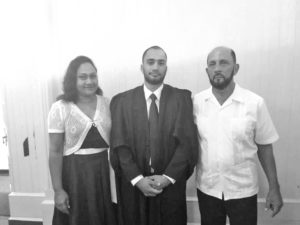By Akeem Greene
Recently admitted to the bar, Attorney-at-Law Brandon Scott De Santos’ passion is being a proficient criminal defence lawyer and providing his insight into ‘correcting some wrongs’ in the local justice system.
Brandon was admitted to the bar on October 13, 2017 by Justice Sandil Kissoon after his petition was read by mentor, Senior Counsel Bernard DeSantos, of whom he is now attached at the Chambers of De Santos and Associates and has no familial relations to.

In an interview with Sunday Times Magazine, Brandon admitted that his desire to become an attorney did not originate from a “fairy-tale inkling”, rather was prompted by family, teachers and other supporters to get on this career path.
“To be honest, I didn’t dream of it. There wasn’t any miraculous story that got me here. I think the best way to explain it was that a lot of people, such as my teachers, parents and even high school friends, believed that studying law was a good fit for me. It’s through their encouragement that I am now an Attorney-at-Law. But what I’d like them to know is that getting here wasn’t only about arguing and proper speech. While those are important, I believe that the ability to be strategic and resourceful is even more important,” he pointed out.
The former Bishops’ High School student demonstrated proficiency in criminal law both at the University of Guyana (UG) and Hugh Wooding Law School (HWLS). He said that he “enjoyed the content”, hence excelling.
Brandon stated he is “privileged and extremely lucky” to have received guidance from Bernard De Santos, SC, who is well-known locally for his criminal law practice.
“My choice before admission to the bar was criminal law, and working at the Chambers of De Santos and Associates has solidified my desire,” the 24-year-old declared.
Support system
In the Caribbean, the approximate number of years to qualify as an attorney is five years – three to attain a Bachelor of Laws degree and two for the Legal Education Certificate. This means an arduous journey of long hours and sleepless nights. However, with the support of his family and others, Brandon was able to succeed.
“Overwhelming support came from my family: my parents, siblings [four of them], my aunt and uncle and cousins in Trinidad and Tobago, with whom I stayed from 2015-2017 while attending HWLS. Also my colleagues, particularly Kurt Da Silva, who was an immense help to all the recent graduates of HWLS.
“At UG, Professor Keith Massiah and the late Professor Sheldon McDonald encouraged me vastly. Prof Massiah encouraged me to push on when I considered dropping a subject I was worried I could not get a good grade in. He refused to accept me in that second course and told me that it matters not what I do, that I was a student that would excel wherever I applied myself. I was most happy to prove him correct when I got an A in the course, which I initially thought was daunting. Mr McDonald taught me the importance of being to the point and being well-structured and not to succumb to the fear of impending examinations (which would now be surrounding circumstances such as timelines compliance, appearing against Practitioners with vast experience and appearing before the sternest of Magistrates and Judges),” he recalled.
Though graduating from UG with a distinction in 2015, Brandon admitted he had thoughts of “giving up” while at HWLS. Though his challenges were few, Brandon said that the “hardest leg” of his academic journey was living in Trinidad and getting accustom to the culture there.
“The only time I thought of giving up was when I was in Trinidad; however, the consideration of time and money spent to get there and knowing this was the final hurdle always encouraged me. I found motivation by telling myself if others did it in the past, so could I,” Brandon remembered.
A desire to effect change
The attorney said there is a need to further develop the legal system in Guyana; however, if it was a perfect system then there would be no need for attorneys. In his opinion, Guyana needs to adapt (within reason) to the needs of an ever-changing society.
“An example I can think about off the top of my head is the current marijuana situation. I am still not convinced that it should be legalised. However, in my respectful opinion, the current sentencing for possession is too stringent, particularly since possession of marijuana is what is sometimes referred to as a victimless crime.
“I find myself in a quandary because on one hand I prefer to stay out of the public domain, but my intention to practice as a criminal lawyer will see me being placed exactly there. Maybe I’ll be berated by the public, but I know it is my duty to represent my clients within the limits of the law, which I will do at the risk of public rebuke,” he said adamantly.
Preparation
The “best advice” the newly-appointed attorney can give is to “prepare, prepare and prepare”.
While the young attorney plans to continue furthering his studies, for now he aims to get as much exposure as he can to other areas of law, such as administrative and public law, family law and environmental law.



